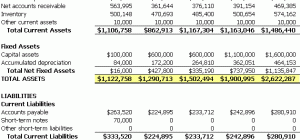 Every business needs tight and perceptive financial management on an ongoing basis, and most business men and women opt to outsource all or part of their bookkeeping tasks to a CPA (certified public accountant). This is unsurprising, considering how important and yet how complex tax law, budgeting, cash flow management, and other bookkeeping tasks are in the 21st Century, but how do you know if an accountant really has the skills to optimally benefit your business?
Every business needs tight and perceptive financial management on an ongoing basis, and most business men and women opt to outsource all or part of their bookkeeping tasks to a CPA (certified public accountant). This is unsurprising, considering how important and yet how complex tax law, budgeting, cash flow management, and other bookkeeping tasks are in the 21st Century, but how do you know if an accountant really has the skills to optimally benefit your business?
Like so many things in life, asking the right questions is the key to probing for value and laying a foundation for a wise decision. Here are six questions you should ask your current or prospective accountant when deciding on whom you will rely for future financial advice/services for your business:
1. Can You Help Me Set Achievable, Measurable Business Goals?
If your accountant has any significant experience working with business clients, and any special knowledge of the particular industry in which your business is located, he should be able to assist you in forming wise short, medium, and long-term business goals.
Of course, you have to provide some input, for accountants aren’t mind readers. They can’t decide for you what direction you want to take your business in the years ahead. But, given your basic aspirations and your current financial situation, a good CPA should be able to help you set measurable goals that stretch you but don’t break you And they should also help you set milestone markers along the way to both to encourage you and keep you on track.
2. How Healthy Is My Business Today?
Like a doctor assessing the physical health of his/her patients, a professional accountant can analyze the financial health of a corporate body.
Beyond just crunching numbers and handing you pages full of dizzying spreadsheets and computations, the perceptive accountant knows how to “make sense of” those numbers and explain their import to you in a language you understand.
Specifically, the CPA should be able to pinpoint your break-even point and tell you how many products/services you must sell within a given period to stay afloat and meet goals. He/she should also be able to find ways you can increase cash flow and boost your bottom line. This might mean investing in new, more productive equipment, cutting unnecessary expenses, increasing/decreasing staff levels and hours, or investing in new marketing campaigns, online or offline, to generate more revenue.
3. What Is My Best Available Tax Strategy?
This is probably the number one reason people seek out a CPA. Taxes are tough on businesses and can affect them in unsuspected ways. Thus, you need your accountant to be fully up to date on U.S. and state-level tax laws so you can take full advantage of deductions and credits and any new tax laws that may benefit you.
You need all of your financial paperwork in order to maximize deductions, prevent an audit, and survive an audit should you, unfortunately, be subjected to one.
4. How Can I Make My Business Grow?
An accountant is not necessarily a growth expert, though the most valuable accountants will have expertise in this area based on their longtime experience with how real-world businesses grow over a period of time.
A top-tier business accountant can help see the true costs/benefits of making new hires, how many new clients your marketing campaign needs to land to be beneficial, and how much new customer traffic you need to generate at a new location to pay for a new building in x number of years.
5. Can You Financially Analyze This Business Contract?
An accountant is not a lawyer and should not pretend to be one. That said, a good accountant can take the financial end of a business contract you are considering signing and shed some light on it. Working along with an attorney, your accountant can help you avoid agreeing to contracts that are too risky and don’t have enough potential of reward.
6. How Much Is My Business Worth?
Sometimes, you need to know how much your business, as a whole, is worth. Maybe you want to sell it or to convert it to a franchise in the near future. There is much demand for this kind of assessment, which explains why there is such a great business opportunity in the accounting franchises these days. But on your end, you need to know what kind of price tag you can reasonably put on your business when/if you put it up for sale.







